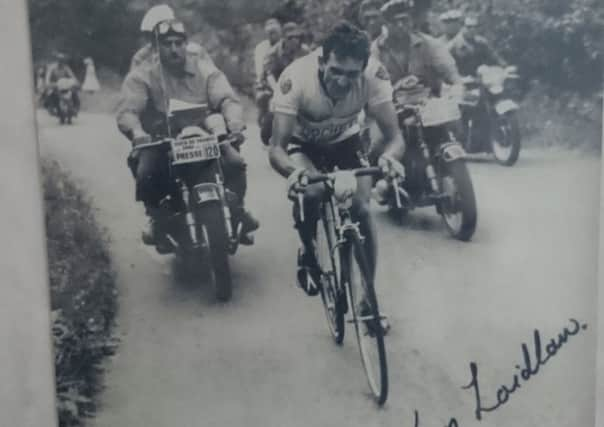'˜Unknown' Laidlaw bid to be first Scot to finish tour de France


On 11 July 1961 during stage 16 from Toulouse to Superbagneres in the Pyrenees he almost pulled off the unthinkable – to emulate the only Briton to have won a stage until then, Englishman Brian Robinson who claimed stage wins in 1958 and 1959. The stage covered 208 kilometres and included three important mountain climbs,the third-category Ares, the second-category Portillon and the first- category ascent to the finish.
Laidlaw crossed the 4,300 feet high peak of the Portillonin third behind Italy’s Imerio Massignan, who would win the King of the Mountains title, and legendary Frenchman Jacques Anquetil, who would go on to win the race, adding to his 1957 success. So far the determined Scot had exceeded expectations and was travelling in very high-class company. Not only were these top-drawer individuals but they enjoyed the support of powerful teams, whereas, by this point, Laidlaw was on his own, many of his team-mates either having abandoned or fallen well behind. After the hazardous descent of the second category peak, the 20km climb to the 6,000 feet high finish soon began.
Advertisement
Hide AdAdvertisement
Hide AdBy now after over two punishing weeks on the road among a minority of English speakers in the peloton and irked by the continental cyclists’ superior attitude to their British counterparts, the bold Borderer decided to go for bust. A few kilometres into the climb he made his move overtaking the yellow jersey of Anquetil, Massignan, former winner Charly Gaul and their lieutenants in a swift surprise attack, much to the astonishment of Tour Radio. “An attack by No 90 Laidlaw as the pack begins the climb from Luchon” exclaimed the commentator, adding in equally feverish tones that “Laidlaw was thrashing away for all he was worth.”
A virtual unknown in France challenging cycling royalty, what was going on? His lead extended to over 100 metres while he fought manfully to keep the pack at bay and sought to convince himself that being out on his own as he slugged his way up the ever steepening gradient after more than five hours in the saddle was no big deal. Inevitably like the fox with the hounds closing Anquetil and friends reeled him in with about six kilometres to go as he ran out of steam.
Meanwhile, a gale was raging as the riders approached the summit where Laidlaw crossed the line 19th in a group of 12 whom he had latched on to in the painful closing stages, about a mile and a half behind Massignan.
Although he had not achieved the sought-after stage win and had weakened towards the end, his exceptional effort had not gone unnoticed. In addition to $450, the Tour also awarded him the stage’s ‘ Prix de la Combativite’, the prize for the most combative rider of the day for his solo breakaway. In recognition of his feat he was presented with a special commemorative ‘dossard’, his No 90, which he proudly wore through to the Champs-Elysees in Paris. It was particularly gratifying for Laidlaw to receive that award as the Tour supremo Jacques Goddet, disappointed at the lack of challenge to Anquetil in the race, had written strongly criticising riders who did not dare to attack the yellow jersey, referring to them as “repulsive dwarves, impotent, submissive, satisfied in their own mediocrity.” Certainly not accusations that could be laid at the Hawick man’s door.
At this remove it is difficult to appreciate fully the scale of Laidlaw’s achievement in being the first Scot to complete the Tour, accustomed as we have become to a steady diet of success in the event courtesy of Messrs. Wiggins and Froome in particular.
The odds were truly stacked against him in a race that was then over 500 miles longer than the current version. No surprise then to hear that he told fellow townsman and cyclist Ian Anderson that “the Tour was one week of pain followed by two weeks of agony.”
A member of Hawick Cycling Club as a teenager, his promise was first noted when he won its open 10-mile event as a junior. A dedicated trainer, he soon began winning regularly, including national titles. Increased competitive opportunities led to him joining famous Glasgow club V.C. Stella before national service in the army allowed his career to flourish, thanks to a 700-mile a week training regime.
Competing for Scotland at the 1958 Empire Games in Cardiff was followed by representing Britain at the 1960 Olympics in Rome and an excellent 16th place, top Briton, in the World Amateur road race championship in Leipzig. He found two years in the professional ranks less fulfilling and emigrated to the States in the mid 1960s where he has latterly lived in Savannah, Georgia, continuing to enjoy recreational cycling.
l Hawick Cycling Club again host their ‘Ken Laidlaw Sportive’ event in aid of charity on 20 August.